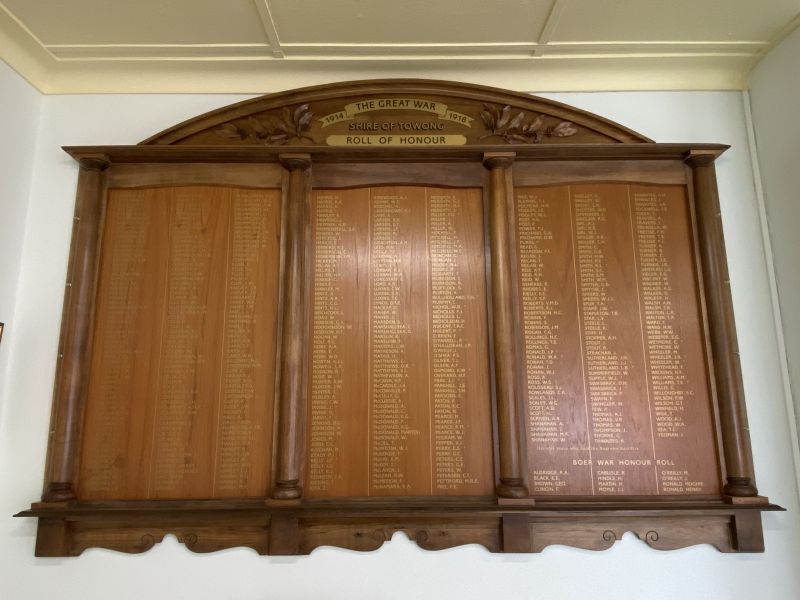Antonio Victor Travers
Antonio was born on the 16th of February, 1895 at Tallangatta, Victoria. He was the son of Antonio Victor and Annie (née Macklan) Travers. In 1901 tragedy struck the family, as outlined in the 15th of August, 1901, edition of the Upper Murray and Mitta Herald.
“Sudden Death at Tallangatta
A shockingly sudden death occurred near Tallangatta on Sunday morning last, the victim being Mrs. Travers, wife of Mr Antonio Travers, the well-known wood-carter. Mrs. Travers was sitting up in bed playing with her baby, aged 4 months. The other children were playing out the in the front of the house, when one of them, a little girl aged 10 years, heard the baby crying and returned to the bedroom. The child then found the baby lying on the bed at her mother’s feet. The mother was lying back in the bed, and was black in the face. The poor child cried out to her father, who, on running into the bedroom, found his wife dead. The police and doctor were notified, and arrangements were made for a post mortem examination, which was held in the afternoon. The deceased was a daughter of Mr J. Macklan, or Tallangatta Valley. It is a very sad case indeed, as the father is left with a family of five, the eldest being 10 years old and the youngest only 4 months old. Mrs J. Thwaites, of Tatonga, with characteristic kindness, has taken charge of the infant, pending arrangements for its upbringing. The funeral took place on Tuesday and was numerously attended. Minister: Rev. Pay. Undertaker: Mr J. Brown.”
In 1909, Antonio senior married Maria Hart, a widower who brought a number of children to the extended family. Antonio senior was apparently quite a character in the Tallangatta area during the late 1800’s and early 1900’s. He was well built and Swiss born. Early in his life he had served in the Dutch Army in Sumatra and other Dutch colonies. In 1910, the Upper Murray and Mitta Herald described him as a “horny-handed son of toil, who has not been too proud or haughty to undertake some lowly occupations in order to crack an honest crust.” That same year he discovered that he was the last male descendant of the line of the Emperor of Austria. As such he inherited an Austrian title of an earldom. Unfortunately for the family, the estate was impoverished.
On the 29th of April, 1916, Antonio junior enlisted in the AIF at Cootamundra in New South Wales. He was 21 at the time and working as a labourer in the area. He was allotted the Regimental Number 5892 and was posted to B Company of the 2nd Battalion. After completing his basic training he was take on strength with the 16th Reinforcements for the 19th Battalion. This unit embarked on HMAT A40 Ceramic at Sydney on the 7th of October.
They reached Plymouth, England on the 21st of November 1916 and were sent to join the 5th Training Battalion at Fovant, Wiltshire. While stationed in England Antonio twice came into contact with military discipline. The first was when he went AWL (absent without leave) for two days in December. His penalty was the forfeiture of eight days pay. The second occurred on the 8th of February, 1917, when he displayed “conduct to the prejudice of good order and Military discipline, by refusing to obey an order of an NCO (non-comissioned officer)”. For this he forfeited five days pay and was confined to camp for six days.
On the 25th of February he proceeded overseas to France on the SS Golden Eagle. The following day he marched into the 2nd Australian Division Base Depot at Etaples. One week later he was taken on strength with the 19th Battalion.
The battalion was part of the 5th Brigade of the 2nd Australian Division. On the 3rd of May it was one of the units taking place in the second attempt to capture the village of Bullecourt. At 0114 hours on the morning of the 3rd of May, the battalion moved up to the starting line. Zero hour occurred at 0345 hours. Unfortunately, as the lines moved up there was a tendency to move to the left which resulted in lines becoming bunched up. Upon arriving at the German wire the first and second waves moved through only to find that some men from other waves had closed up with them. The disorganisation caused problems. The German machine gunners then let loose with a hailstorm of lead. Casualties were severe. As the day progressed it became impossible to get runners across No Man’s Land or casualties back to clearing stations. Of the 14 Officers and 550 OR’s that started the day, 12 Officers and 347 OR’s had become casualties. At 0410 hours on the morning of the 4th of May, the battalion was relieved by the 4th Battalion.
Australian reinforcements from the 1st and 5th Australian Divisions joined the fight and repelled fierce German counterattacks. British troops managed to seize the eastern side of the village and link up with the Australians. The village was taken.
When the 19th Battalion stopped and took a roll call, Antonio Travers was one of the men who did not respond. He has no known grave. He is remembered at the Australian War Memorial Roll of Honour, the Villers-Bretonneux Memorial (Australian National Memorial), the Granya War Memorial, and the Boer War and WW1 Roll of Honour at Tallangatta, Victoria. For his service he was awarded the British War Medal and the Victory Medal.
Antonio’s service records contain a hand written letter from his father to Base Records in Melbourne, dated the 19th of September. He writes that his son, John, received a letter from a former employee that he had seen Antonio in London in early 1918. Antonio senior states that the writer of the letter had previously worked with the Traver family and that he had joined up at the same time as his younger son, therefore he would have known him. Antonio senior pleads with Base Records to make further enquiries. He was not alone in the format of his letter, as many families grasped onto any hope that their loved ones may still be alive. In signing his name, Antonio senior includes his surname as de Travers, underlining the ‘de’. It’s clear that when Antonio junior enlisted he didn’t want that part of his surname included. There is no record of any correspondence from Base Records.
In 1929, Antonio senior and his wife, Maria, awoke to find their house ablaze. While they managed to survive, the house and many precious items were lost, including the only photograph of Antonio junior in uniform.
 Stephen Learmonth
Stephen Learmonth